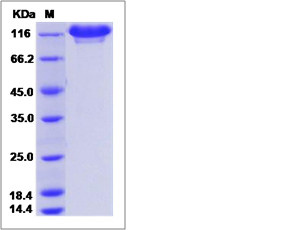Mouse Tie2 / CD202b / TEK Protein (ECD, Fc Tag)
AA517024,Cd202b,Hyk,STK1,Tie-2,Tie2
- 100ug (NPP1695) Please inquiry
| Catalog Number | P51087-M02H |
|---|---|
| Organism Species | Mouse |
| Host | Human Cells |
| Synonyms | AA517024,Cd202b,Hyk,STK1,Tie-2,Tie2 |
| Molecular Weight | The recombinant mouse Tek consists 964 amino acids and predicts a molecular mass of 107.7 kDa. |
| predicted N | Val 19 |
| SDS-PAGE |  |
| Purity | > 95 % as determined by SDS-PAGE. |
| Protein Construction | A DNA sequence encoding the mouse Tek (NP_038718.2) (Met1-Lys744) was expressed with the Fc region of human IgG1 at the C-terminus. |
| Bio-activity | 1. Measured by its binding ability in a functional ELISA. 2. Immobilized mouse ANGPT2 (P50298-M07H) at 10 μg/mL (100 μL/well) can bind mouse TEK-Fc. The EC50 of mouse TEK-Fc is 0.58-1.34 μg/mL. |
| Research Area | Immunology |Inflammation / Inflammatory Mediator |Inflammatory Cytokines & Chemoki and Receptors |Angiopoietins and Angiopoietin-like Protein Families |
| Formulation | Lyophilized from sterile PBS, pH 7.4. 1. Normally 5 % - 8 % trehalose and mannitol are added as protectants before lyophilization. Specific concentrations are included in the hardcopy of COA. |
| Background | TEK, or TIE-2, is an endothelial cell-specific receptor tyrosine kinase (RTK) that is known as a functioning molecule of vascular endothelial cells. TEK comprises a subfamily of RTK with TIE, and these two receptors play critical roles in vascular maturation, maintenance of integrity and remodeling. Targeted mutagenesis of both Tek and its agonistic ligand, Angiopoietin-1, result in embryonic lethality, demonstrating that the signal transduction pathways mediated by this receptor are crucial for normal embryonic development. TEK signaling is indispensable for the development of the embryonic vasculature and suggests that TEK signaling may also be required for the development of the tumor vasculature. |
| Reference |
